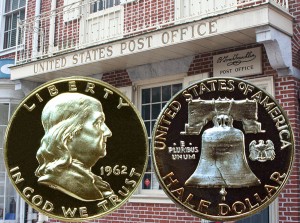Today, the Franklin Silver Half Dollar Coin helps us remember the first Post Office back in 1639.
Did you ever wonder what people did back in the early days of the colonies for communication with their families across the sea?
The description in Parton’s Life of Franklin showed the early letters had an interesting and trusting journey back and forth.
“Letters arriving from beyond the sea were usually delivered on board the ship into the hands of the persons to whom they were addressed, every family sending a member on board for the purpose of receiving letters. Letters not called for were taken by the captain to a coffee-house near the wharf, where they lay spread out on a table waiting the coming of their owners. Persons from the adjacent settlements called at the coffee-house, and carried away not only their own letters, but all the letters belonging to people in the neighborhood, which they either delivered in person, or deposited at the house of the minister or magistrate, or some relative of the individual to whom the letter was addressed. Hence the custom grew of depositing at the ship coffee-house letters written in the town and destined to a place in the interior, as well as letters brought from the country and directed to an inhabitant of the town. As the settlements grew in number and magnitude it became usual to leave letters directed to one of them at the inn most frequented by the inhabitants of that settlement. Thus, several years before there was a post-office or a post-rider in the colonies, a rude, slow, unsafe, but neighborly system of letter-delivery had sprung up; and long after the establishment of a post-office, this neighborly method continued to be the main dependence of the people for the transportation of letters for short distances.”
On November 5, 1639, the informal use of a public house for mail was legalized with the following decree by the Court:
“For preventing the miscarriage of letters, it is ordered, that notice be given that Richard Fairbanks, his house in Boston, is the place appointed for all letters which are brought from beyond the seas, or are to be sent thither, to be left with him; and he is to take care that they are to be delivered or sent according to the directions; and he is allowed for every letter a penny, and he must answer all miscarriages through his own neglect in this kind,—provided that no man shall be compelled to bring his letters thither, except he please.”
Over the next decades, local authorities in each of the colonies operated postal facilities.
In 1692, the British Crown approved a centralized postal system for Thomas Neale. Neale never came to America. Becoming heavily in debt, he assigned his interests to Andrew Hamilton and Robert West.
In 1707, the British government purchased the postal system and appointed Hamilton’s son as the deputy postmaster general.
In 1737, Alexander Spotswood, the current deputy postmaster general appointed Benjamin Franklin as the postmaster of Philadelphia.
In 1753, the British Crown appointed Franklin and William Hunter, postmaster for Williamsburg, VA, as joint deputy postmasters general for the colonies.
Over the course of the next several years, Franklin toured the post offices of the colonies in the North and as far south as Virginia.
He began adding standardized processes and devised shorter routes for the postmen making the system more efficient.
Under his care, the colonial postal system listed their first profit in 1760.
Before being terminated by the Crown for “actions sympathetic to the cause of the colonies,” Franklin developed postal routes from Maine to Florida and from New York to Canada with regular routes going from the colonies overseas to England and the other mother countries.
After losing the job in 1774, the Continental Congress on July 26, 1775 unanimously chose Benjamin Franklin, Esqr. as their new Postmaster General under the following legislation:
“That a postmaster General be appointed for the United Colonies, who shall hold his office at Philada, and shall be allowed a salary of 1000 dollars per an: for himself, and 340 dollars per an: for a secretary and Comptroller, with power to appoint such, and so many deputies as to him may seem proper and necessary.
“That a line of posts be appointed under the direction of the Postmaster general, from Falmouth in New England to Savannah in Georgia, with as many cross posts as he shall think fit.
The Congress chose Mr. Franklin to serve for one year or until a future Congress appoints a replacement.
The Franklin Silver Half Dollar Coin shows against the Benjamin Franklin Post Office in Philadelphia.
